The Week in Freethought History (December 9-15)
Here’s your Week in Freethought History: This is more than just a calendar of events or mini-biographies – it’s a reminder that, no matter how isolated and alone we may feel at times, we as freethinkers are neither unique nor alone in the world.
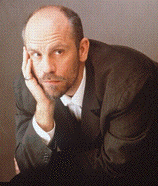 Last Sunday, December 9, but in 1953, American actor John Malkovich was born. The award-winning actor co-founded Steppenwolf Theater in Chicago with long-time pal Gary Sinise. In 2000, Malkovich was in Chicago to direct the play Hysteria at Steppenwolf. Martha Lavey for WTTW Chicago asked Malkovich his thoughts on Freud, the subject of the play. “I think he was fantastic, a fantastic man,” said Malkovich. “I also particularly like him because he was an atheist, and I grew tired of religion some time not long after birth. I believe in people, I believe in humans, I believe in a car, but I don’t believe something I can have absolutely no evidence of for millenniums. And it’s funny — people think analysis or psychiatry is mad, and they go to church…” In a 2003 issue of the Australian magazine The Age, the interviewer says of John Malkovich, “He considers himself a libertarian, a liar (but only to entertain himself) and an atheist.”
Last Sunday, December 9, but in 1953, American actor John Malkovich was born. The award-winning actor co-founded Steppenwolf Theater in Chicago with long-time pal Gary Sinise. In 2000, Malkovich was in Chicago to direct the play Hysteria at Steppenwolf. Martha Lavey for WTTW Chicago asked Malkovich his thoughts on Freud, the subject of the play. “I think he was fantastic, a fantastic man,” said Malkovich. “I also particularly like him because he was an atheist, and I grew tired of religion some time not long after birth. I believe in people, I believe in humans, I believe in a car, but I don’t believe something I can have absolutely no evidence of for millenniums. And it’s funny — people think analysis or psychiatry is mad, and they go to church…” In a 2003 issue of the Australian magazine The Age, the interviewer says of John Malkovich, “He considers himself a libertarian, a liar (but only to entertain himself) and an atheist.”
 Last Monday, December 10, but in 1953, the first issue of Playboy magazine was published, undated, by 27-year-old Chicago-born entrepreneur Hugh M. Hefner. Quipped Hefner, years later, “If there was going to be a sexual revolution, I would be its pamphleteer.” “I’ve never thought of Playboy, quite frankly, as a sex magazine,” Hefner said in a 2002 CNN profile. As Hefner phrased it in the Playboy Philosophy, “If a man has a right to find God in his own way, he has a right to go to the devil in his own way also. …
Religious leaders can attempt to persuade us of the correctness of their beliefs …
They have no right, however, to attempt in any way to force their beliefs on others. And most especially, they have no right to use the power of the government to implement such coercion.” Often criticized by the puritan contingent of the feminist movement he and his magazine had supported from the beginning, Hefner replies, “Everybody, if they’ve got their head on straight, wants to be a sexual object, among other things. They want to be attractive. Otherwise, what a sad and pathetic life. To really live a worthwhile life is to be attracted to and attractive to other people. “Playboy exploits sex the way Sports Illustrated exploits sports,” says Hefner.
Last Monday, December 10, but in 1953, the first issue of Playboy magazine was published, undated, by 27-year-old Chicago-born entrepreneur Hugh M. Hefner. Quipped Hefner, years later, “If there was going to be a sexual revolution, I would be its pamphleteer.” “I’ve never thought of Playboy, quite frankly, as a sex magazine,” Hefner said in a 2002 CNN profile. As Hefner phrased it in the Playboy Philosophy, “If a man has a right to find God in his own way, he has a right to go to the devil in his own way also. …
Religious leaders can attempt to persuade us of the correctness of their beliefs …
They have no right, however, to attempt in any way to force their beliefs on others. And most especially, they have no right to use the power of the government to implement such coercion.” Often criticized by the puritan contingent of the feminist movement he and his magazine had supported from the beginning, Hefner replies, “Everybody, if they’ve got their head on straight, wants to be a sexual object, among other things. They want to be attractive. Otherwise, what a sad and pathetic life. To really live a worthwhile life is to be attracted to and attractive to other people. “Playboy exploits sex the way Sports Illustrated exploits sports,” says Hefner.
 Last Tuesday, December 11, but in 1803, French Romantic composer Hector Berlioz was born. Berlioz never studied piano, but entered the Paris Conservatoire anyway. He won the Prix de Rome on his fourth try, with its accompanying pension, in 1830. Berlioz was particularly influenced by the composers Beethoven, Gluck, Spontini and Weber, but also by Shakespeare and the skeptical literature of Byron and Goethe. Not only was Berlioz a complete Agnostic, but his choice of material included just as many secular as sacred works. Like the equally Agnostic Beethoven, Berlioz displays much creativity and Romantic passion in his Requiem – yet just as much passion and power are evident in his Roman Carnival and the operas Les Troyens (a pagan-era epic) and Béatrice et Bénédict (based on Shakespeare). Far from experiencing a spiritual epiphany and reconciliation to the dying off of his close friends as his own end drew near, Berlioz maintained his disbelief in God and immortality. In one of his last letters, written shortly before his death in Paris at age 67, on 8 March 1869, Berlioz wrote his creed: “I believe nothing.”
Last Tuesday, December 11, but in 1803, French Romantic composer Hector Berlioz was born. Berlioz never studied piano, but entered the Paris Conservatoire anyway. He won the Prix de Rome on his fourth try, with its accompanying pension, in 1830. Berlioz was particularly influenced by the composers Beethoven, Gluck, Spontini and Weber, but also by Shakespeare and the skeptical literature of Byron and Goethe. Not only was Berlioz a complete Agnostic, but his choice of material included just as many secular as sacred works. Like the equally Agnostic Beethoven, Berlioz displays much creativity and Romantic passion in his Requiem – yet just as much passion and power are evident in his Roman Carnival and the operas Les Troyens (a pagan-era epic) and Béatrice et Bénédict (based on Shakespeare). Far from experiencing a spiritual epiphany and reconciliation to the dying off of his close friends as his own end drew near, Berlioz maintained his disbelief in God and immortality. In one of his last letters, written shortly before his death in Paris at age 67, on 8 March 1869, Berlioz wrote his creed: “I believe nothing.”
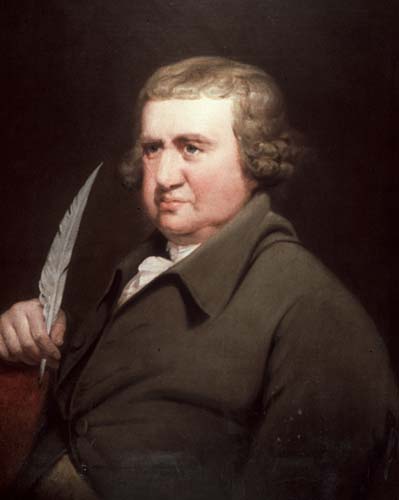 Last Wednesday, December 12, but in 1731, the second most famous Darwin, and grandfather to the author of On the Origin of Species, Erasmus Darwin was born. His medical practice became so respected that he was invited, though he declined, to be personal physician to King George III. Erasmus Darwin was also a well known poet, philosopher, botanist, and naturalist. He founded the Philosophical Society in Derby. “In regard to religious matters,” he wrote, “there is an intellectual cowardice instilled into the minds of the people from their infancy; to inquire or exert their reason is denounced as sinful.” Erasmus Darwin helped to revive interest in the old Greek idea of evolution with his Deistic Zoonomia (1794), which was written in verse. The Temple of Nature, published posthumously (1802), and also written in verse, further explored evolutionary ideas that were adopted and expanded by his grandson some 60 years later. It was Erasmus Darwin who said, “Many theatrical preachers … successfully inculcate the fear of death and hell, and live luxuriously on the folly of their hearers. The latter have so much intellectual cowardice that they dare not reason about those things which they are directed by their priests to believe.”
Last Wednesday, December 12, but in 1731, the second most famous Darwin, and grandfather to the author of On the Origin of Species, Erasmus Darwin was born. His medical practice became so respected that he was invited, though he declined, to be personal physician to King George III. Erasmus Darwin was also a well known poet, philosopher, botanist, and naturalist. He founded the Philosophical Society in Derby. “In regard to religious matters,” he wrote, “there is an intellectual cowardice instilled into the minds of the people from their infancy; to inquire or exert their reason is denounced as sinful.” Erasmus Darwin helped to revive interest in the old Greek idea of evolution with his Deistic Zoonomia (1794), which was written in verse. The Temple of Nature, published posthumously (1802), and also written in verse, further explored evolutionary ideas that were adopted and expanded by his grandson some 60 years later. It was Erasmus Darwin who said, “Many theatrical preachers … successfully inculcate the fear of death and hell, and live luxuriously on the folly of their hearers. The latter have so much intellectual cowardice that they dare not reason about those things which they are directed by their priests to believe.”
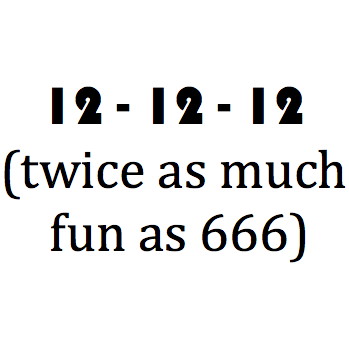 Last Wednesday, 12-12-12, was also a day of “energetic significance,” at least according to numerologist Stephanie Sterling. But Wake Forest University physics professor Eric Carlson told Huffington Post “Although repetitive patterns like 12/12/12 are interesting, they have no more special significance than when your car’s odometer hits 121,212 miles.” It’s also an easy way to deflect responsibility from our own failings by blaming them on the stars… or the calendar. But different cultures use different calendars: 12-12-12 has no significance in the Jewish, Chinese or – obviously – Mayan calendars! And remember, the West changed from the Julian calendar to the Gregorian calendar we use today beginning in 1582. The delusion is understandable in a narrow sense: Reducing complexity to a mathematical formula gives an patina of science to simple superstition. Besides, 12-12-12 has already happened – 2,000 years ago: the correct date for last Wednesday is 12-12-2012!
Last Wednesday, 12-12-12, was also a day of “energetic significance,” at least according to numerologist Stephanie Sterling. But Wake Forest University physics professor Eric Carlson told Huffington Post “Although repetitive patterns like 12/12/12 are interesting, they have no more special significance than when your car’s odometer hits 121,212 miles.” It’s also an easy way to deflect responsibility from our own failings by blaming them on the stars… or the calendar. But different cultures use different calendars: 12-12-12 has no significance in the Jewish, Chinese or – obviously – Mayan calendars! And remember, the West changed from the Julian calendar to the Gregorian calendar we use today beginning in 1582. The delusion is understandable in a narrow sense: Reducing complexity to a mathematical formula gives an patina of science to simple superstition. Besides, 12-12-12 has already happened – 2,000 years ago: the correct date for last Wednesday is 12-12-2012!
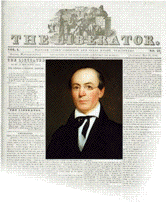 Last Thursday, December 13, but in 1805, American abolitionist William Lloyd Garrison was born. Apprenticed early on to a printer, he rose to become editor of several journals after becoming involved in the early fight against slavery, a socially destructive institution the churches had long ignored – when they did not outright support it. Garrison was influenced not only by the Deist Thomas Paine, but by skeptical feminists such as Susan B. Anthony, Elizabeth Cady Stanton, Lucretia Mott and Lucy Stone. He harshly criticized the churches, north and south, for neglecting to condemn slavery – some of the southern churches actually owned slaves – and in return the southern churches put a bounty on his head. Garrison himself never went to church. In the biography written by his children, he is described as a Theist who had “quite freed himself from the trammels of orthodoxy.” It was William Lloyd Garrison who said, “All Christendom professes to receive the Bible as the word of God, and what does it avail?”
Last Thursday, December 13, but in 1805, American abolitionist William Lloyd Garrison was born. Apprenticed early on to a printer, he rose to become editor of several journals after becoming involved in the early fight against slavery, a socially destructive institution the churches had long ignored – when they did not outright support it. Garrison was influenced not only by the Deist Thomas Paine, but by skeptical feminists such as Susan B. Anthony, Elizabeth Cady Stanton, Lucretia Mott and Lucy Stone. He harshly criticized the churches, north and south, for neglecting to condemn slavery – some of the southern churches actually owned slaves – and in return the southern churches put a bounty on his head. Garrison himself never went to church. In the biography written by his children, he is described as a Theist who had “quite freed himself from the trammels of orthodoxy.” It was William Lloyd Garrison who said, “All Christendom professes to receive the Bible as the word of God, and what does it avail?”
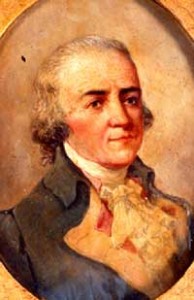 Yesterday, December 14, but in 1739, French economist and industrialist Pierre Samuel Dupont was born. The family name is chiefly remembered for the company founded by his son, but the elder Dupont influenced Adam Smith’s ideas in the latter’s Wealth of Nations during the 1760s with his own writings on the national economy of France. He accepted the French Revolution when it came, but the Terror horrified him and he narrowly escaped execution for supporting only moderate reforms. Dupont emigrated to America where he had influence with Thomas Jefferson, having aided in the Louisiana Purchase, and his son made a fortune manufacturing gunpowder as E.I. Dupont de Nemours and Company. As Dupont explained in his Philosophie de l’univers (1796), he was a Deist.
Yesterday, December 14, but in 1739, French economist and industrialist Pierre Samuel Dupont was born. The family name is chiefly remembered for the company founded by his son, but the elder Dupont influenced Adam Smith’s ideas in the latter’s Wealth of Nations during the 1760s with his own writings on the national economy of France. He accepted the French Revolution when it came, but the Terror horrified him and he narrowly escaped execution for supporting only moderate reforms. Dupont emigrated to America where he had influence with Thomas Jefferson, having aided in the Louisiana Purchase, and his son made a fortune manufacturing gunpowder as E.I. Dupont de Nemours and Company. As Dupont explained in his Philosophie de l’univers (1796), he was a Deist.
 Today, December 15, but in 1790, the first U.S. school of law was established at the University of Pennsylvania. After a series of lectures by James Wilson, a signer of the Declaration of Independence and a Justice of the first U.S. Supreme Court, “Penn” began offering a full-time program in law. The training and certification of legal service providers was a major development in not just legal history but in the history of government – a further step in the upward evolution of democracy. It is often claimed that Christianity gave us a better-ordered society by giving us the law as we know it today. So says one of many books making that claim. In fact, the very opposite is the case. Just as it was freethinkers, not Christians, who made the world safer for children, decreased crime, ensured the right to divorce, revived education, equalized marriage, and ended slavery and torture – it was freethinkers who revived law as the ancient (pagan) Romans knew it, and carried it forward to the institution we know today. In ancient civilizations, law and the administration of justice were at a much higher level than we find in Christian Europe until the Enlightenment. It is almost comical to see the absurd, procrustean lengths to which Christian apologists will go to try to fit the square peg of canon law into the round hole of secular law, which developed in Europe in spite of the churches. Modern freethinkers are then left to wonder why it took the followers of Christ until the Encyclopedists in France, Beccaria in Italy, and Bentham, Romilly, Mackintosh, and others in England, to institute the legal, juridical and prison reforms we take for granted today – and why the struggle continues to secure rights for workers, for women, for children, and homosexuals, not to mention rights for religious minorities and freethinkers. Until the modern era, the brutality and barbarity of the law, especially in Catholic countries, was unabated. Jules Michelet quotes, in his history of French law, a lord of the Middle Ages who happily abused a serf, saying, “He’s mine – I can boil him or roast him if I want.”
Today, December 15, but in 1790, the first U.S. school of law was established at the University of Pennsylvania. After a series of lectures by James Wilson, a signer of the Declaration of Independence and a Justice of the first U.S. Supreme Court, “Penn” began offering a full-time program in law. The training and certification of legal service providers was a major development in not just legal history but in the history of government – a further step in the upward evolution of democracy. It is often claimed that Christianity gave us a better-ordered society by giving us the law as we know it today. So says one of many books making that claim. In fact, the very opposite is the case. Just as it was freethinkers, not Christians, who made the world safer for children, decreased crime, ensured the right to divorce, revived education, equalized marriage, and ended slavery and torture – it was freethinkers who revived law as the ancient (pagan) Romans knew it, and carried it forward to the institution we know today. In ancient civilizations, law and the administration of justice were at a much higher level than we find in Christian Europe until the Enlightenment. It is almost comical to see the absurd, procrustean lengths to which Christian apologists will go to try to fit the square peg of canon law into the round hole of secular law, which developed in Europe in spite of the churches. Modern freethinkers are then left to wonder why it took the followers of Christ until the Encyclopedists in France, Beccaria in Italy, and Bentham, Romilly, Mackintosh, and others in England, to institute the legal, juridical and prison reforms we take for granted today – and why the struggle continues to secure rights for workers, for women, for children, and homosexuals, not to mention rights for religious minorities and freethinkers. Until the modern era, the brutality and barbarity of the law, especially in Catholic countries, was unabated. Jules Michelet quotes, in his history of French law, a lord of the Middle Ages who happily abused a serf, saying, “He’s mine – I can boil him or roast him if I want.”
Other birthdays and events this week—
December 9: Russian geographer Peter A. Kropotkin, aka Пётр А. Кропоткин, was born (1842)
December 9; Rebel publisher and Freethought fighter Richard Carlile was born (1790)
December 9: The second greatest English poet, John Milton, was born (1608)
December 10: Spanish Arab-Muslim scholar and philosopher Averroës, aka ابن رشد, died (d. 1198)
December 13: One of the greatest German poets of the mid 1800s, Heinrich Heine, was born (1797)
December 14: Sir John Oldcastle was hanged and burned for the Lollard Heresy (d. 1417)
We can look back, but the Golden Age of Freethought is now. You can find full versions of these pages in Freethought history at the links in my blog.

